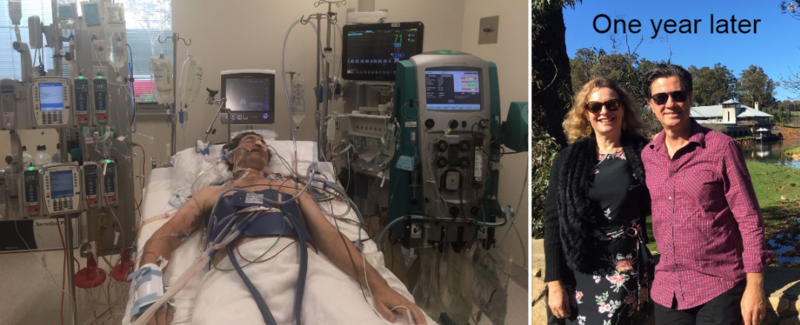WA Country Health Service family member impacted by sepsis
 Wes Hawkins and Nancy Bineham.
Wes Hawkins and Nancy Bineham.
Sepsis is a global health crisis that can affect anyone, anywhere. In fact, one in every five deaths across the globe is associated with sepsis, yet many of us don’t know a lot about it or might still know it as ‘blood-poisoning’.
WA Country Health Service Manager of Planning and Evaluation (currently working in the Wheatbelt) Nancy Bineham’s now fiancé Wes Hawkins has thankfully survived from severe sepsis which resulted in multi-organ failure, endocarditis and two mitral valve replacements (following the failure of the first attempt). Initially, Wes and Nancy both thought Wes was suffering from influenza. And even when Wes presented to hospital the doctors thought it may be meningococcal due to the spots on his feet and hands and placed him into an isolation room. It wasn’t until 24 hours later when his blood cultures came back did they learn it was sepsis.
“It came on so quickly,” Wes said.
“I cycled in to work in the morning feeling fine and then by the afternoon I was shivering and went to sleep fully clothed when I got home.
“I stayed in bed for two days thinking I had a terrible flu – then I started vomiting and my temperature was 39 degrees which is when Nancy called Health Direct who called an ambulance and they whisked me off to Royal Perth Hospital.”
This life-threatening condition occurs when the body’s response to an infection gets out of control. Normally, our immune system fights infections, but sometimes, for reasons we do not yet understand, it attacks our body’s own organs and tissues. The most common sources of sepsis are lung or abdominal infections, but sepsis can also result from the flu, a skin lesion, an indwelling catheter or, in Wes’ case, staphylococcus aureus from no obvious cause.
Wes considered himself ‘disgustingly healthy’ and was on no medication before he was struck down with sepsis. Just a few months prior to his hospitalisation, he and Nancy were celebrating their milestone birthdays while happily travelling around Europe.
While an emotional memory, Nancy can recall Wes’ sepsis journey with clarity, whereas Wes can’t remember a lot of the ordeal saying that it felt like his head was full of cotton wool for months.
“It was terrifying when so many doctors rushed into the Intensive Care Unit as the infection was eating away at Wes’ heart,” Nancy said.
“He couldn’t feed himself and I was told it was touch and go if he would survive.
“12 days after Wes’ first heart valve surgery his heart stopped due to a large blood clot around his heart (cardiac tamponade) and a doctor kept him alive by pumping Wes’ heart with his hand for eight minutes.
“He lost 20 kilos in just eight weeks but we were trying to focus on the small gains like when he could hold a fork again for himself,” Nancy added.
Nancy and Wes wanted to share their story around World Sepsis Day (13 September) to help people gain more of an understanding of sepsis, including some of the common symptoms such as:
• slurred speech or confusion
• extreme shivering or muscle pain/fever
• passing no urine all day
• severe breathlessness
• it feels like you’re going to die
• skin mottled or discoloured.
Prevention can save lives and you’re being urged to remember the following:
• vaccination can prevent infections that lead to sepsis
• only consume and wash food in clean water
• hand hygiene is important
• pay attention to insect bites and skin injuries and keep sepsis in mind in case of infections
• prevention of hospital acquired infections is important in our hospitals and health services.
Sepsis doesn't always end well. Around one in five deaths worldwide are estimated to be from sepsis and up to 50 per cent of survivors experience life-long issues such as muscle weakness and difficulties in sleeping, concentrating and swallowing. Luckily for Wes, aside from daily heart medication, he has now fully recovered, is back to his accounting job as normal and remains positive.
“I even cycled in to work on my second day back after five months off sick,” he said.
Sepsis is a medical emergency. If you or someone you know shows signs of sepsis, seek medical care immediately. If detected early it can be easily treated. Every hour counts.
For more information visit www.australiansepsisnetwork.net.au/healthcare-providers/sepsis-epidemiology

